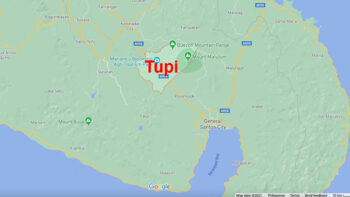Lawyer Raissa Jajurie, Mindanao coordinator of the Sentro ng Alternatibong Lingap Panligal (Saligan) said that theoretically the new city council can decide to again allow banana plantations to resort to aerial spraying even if Mayor Rodrigo Duterte already signed the ordinance banning it.
She said the law allows the city council to review the ordinance and possibly decide to overturn it.
City Councilor Leo Avila III, chair of the committee on environment and natural resources, said there is no such plan but that the apprehension is valid.
He agreed with Jajurie that the city council can reverse the ordinance even if it carries a moratorium period. But he called it a “very hard” option, saying the task would be longer and more difficult.
The legislated ban on aerial spraying does not provide for a moratorium disallowing any amendments.
Avila cited the role of the mayor as very crucial in influencing the new city council, as his stance on the ban also resulted in a unanimous vote.
He said if the mayor will stick to banning aerial spraying, the possibility of reversal is remote.
Interface Development Initiatives (IDIS) executive director Lia Jasmine Esquillo, in a telephone interview with MindaNews, also said the possibility is “highly unlikely.”
She said it will bring shame to the city councilors who voted unanimously in favor of the ban. She predicted that the May 14 election will not change much the composition of the city council.
Duterte signed the ordinance banning aerial spraying on February 10 amid appeals from the Philippine Banana Growers and Exporters Association and intercession from Agriculture Secretary Arthur Yap to veto it.
The city council approved the ordinance on February 23. It was first proposed in August 2004.
The ordinance will be effective on the third week of June after a 90-day phase-out period starting March 22.
The banana industry had accepted the decision to ban aerial spraying in Davao City and pledged they will shift to ground spraying and will not cause jobs displacements. PBGEA, however, has appealed to extend the phase-out period from three months to five years.
Stephen Antig, PBGEA president, said that while they are trying to avoid bringing the issue to court, they are keeping it as one of their options.
Duterte told reporters on March 27 he is not likely to grant an extension of the phase-out period, saying the city government is ready to face any legal challenge against the ordinance.
Jajurie, meanwhile, cited the ‘Green’ vote campaign of local environmentalists as crucial in ensuring that elective officials will not flip-flop on the issue after the elections.
The electorate, she said, must use the campaign period to scrutinize their candidates to minimize the likelihood of a reversal.
The Green Vote 2007 campaign, spearheaded by aerial spray ban advocate IDIS and other groups, vowed to sign a covenant with the candidates on their environment agenda.
Esquillo told reporters earlier they could use it in following up the legislators after elections.
Jajurie said the campaign should involve all candidates so as not to create the impression that they are partisan.
